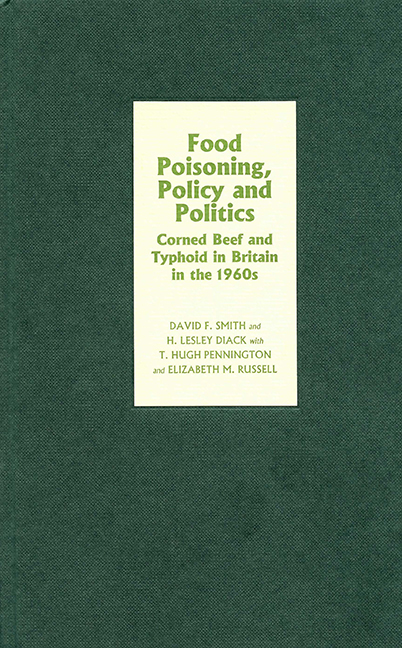Book contents
- Frontmatter
- Contents
- List of illustrations
- Preface and acknowledgements
- Abbreviations used in text
- Abbreviations used in footnotes
- 1 The earlier history of typhoid and food poisoning
- 2 The 1963 corned beef-associated typhoid outbreaks in Harlow, South Shields and Bedford
- 3 The Aberdeen typhoid outbreak
- 4 The medical officer of health, the media and the public in the Aberdeen typhoid outbreak
- 5 Ministers, officials and the Aberdeen typhoid outbreak
- 6 The Milne Committee of Enquiry
- 7 The recommendation on the inspection of overseas meat plants: the roles of existing policy agendas, and interdepartmental and inter-professional tensions
- 8 The disposal of suspect canned meat: the priority of politics over technical advice
- 9 British action to encourage improvements in Argentine meat hygiene, 1964 to 1969
- 10 Summary and conclusions, and food safety since 1964
- Appendix: Recommendations of the Milne Committee
- Bibliography
- Index
10 - Summary and conclusions, and food safety since 1964
Published online by Cambridge University Press: 24 October 2017
- Frontmatter
- Contents
- List of illustrations
- Preface and acknowledgements
- Abbreviations used in text
- Abbreviations used in footnotes
- 1 The earlier history of typhoid and food poisoning
- 2 The 1963 corned beef-associated typhoid outbreaks in Harlow, South Shields and Bedford
- 3 The Aberdeen typhoid outbreak
- 4 The medical officer of health, the media and the public in the Aberdeen typhoid outbreak
- 5 Ministers, officials and the Aberdeen typhoid outbreak
- 6 The Milne Committee of Enquiry
- 7 The recommendation on the inspection of overseas meat plants: the roles of existing policy agendas, and interdepartmental and inter-professional tensions
- 8 The disposal of suspect canned meat: the priority of politics over technical advice
- 9 British action to encourage improvements in Argentine meat hygiene, 1964 to 1969
- 10 Summary and conclusions, and food safety since 1964
- Appendix: Recommendations of the Milne Committee
- Bibliography
- Index
Summary
After the historical introduction to typhoid and food poisoning in Chapter 1, we began the examination of government policy making in connection with the typhoid outbreaks in Chapter 2, which continued in chapters 5 to 9. The first observation we may make from these chapters is that the process of constructing and implementing policy was often very complicated. Several ministries, several divisions within ministries, and a variety of other actors were often involved. Rarely, if ever, did action follow directly and unproblematically from scientific or technical principles, or suppositions concerning risk, or even evidence of actual food-related disease. Decisions on risks deemed theoretical were particularly subject to long drawn-out prevarication, although when there was concrete evidence of food poisoning cases, decision making and action on the basis of technical advice was sometimes achieved relatively quickly. In 1963, three typhoid outbreaks in rapid succession were necessary before a theoretical risk was deemed sufficiently real to justify action. At all times, however, the decision-making process was invariably conditioned, to a greater or lesser extent, by such considerations as the need to protect reputations, the likelihood or otherwise of damaging press publicity, and wider political and economic interests.
In the case of the 1963 typhoid outbreaks, Chapter 2 argued that sensitivity to broader economic and political factors, connected with the recent problems caused by the glut of Argentine chilled beef imports, influenced the way that the civil servants handled the situation. These factors, and the traditional civil service preference for making decisions and acting secretly or quietly, meant that when action was deemed necessary, publicity was avoided as far as possible. Had this not been the case, it might be suggested that the reactions of the public, and the managements of the South American meat plants, may have been such that the Aberdeen typhoid outbreak would not have happened. This notion is reinforced when it is considered that, no matter what other defects British inspectors found in the Argentine meat plants and meat inspection service after 1964, the quality of the cooling water employed in the manufacture of canned meat was almost invariably satisfactory (apart from at one plant in 1972).
- Type
- Chapter
- Information
- Food Poisoning, Policy and PoliticsCorned Beef and Typhoid in Britain in the 1960s, pp. 287 - 309Publisher: Boydell & BrewerPrint publication year: 2005



